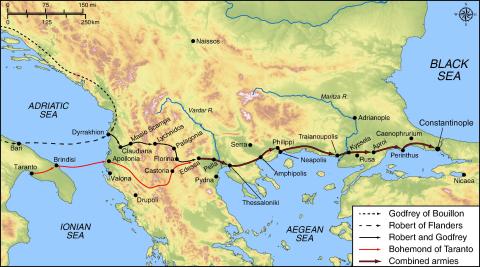Bohemond's March to Constantinople
[1.4.5] Posteā pervēnimus ad flūmen Bardārum. Dēnique perrēxit dominus Boamundus ultrā, cum suā gente, sed nōn tōta. Remānsit enim ibi comes dē Russignōlō, cum frātribus suīs. Vēnit exercitus imperātōris, et invāsit comitem cum frātribus suīs, et omnēs quī erant cum eīs. Quod audiēns Tancredus rediit retrō, et prōiectus in flūmen natandō pervēnit ad aliōs, et duo mīlia mīsērunt sē in flūmen sequendō Tancredum. Tandem invēnērunt Turcopūlōs et Pinzinacōs dīmicantēs cum nostrīs. Quōs repentē fortiter invāsērunt, et prūdenter eōs superāvērunt. Et apprehendērunt plūrēs ex illīs, et dūxērunt illōs ligātōs ante dominī Boamundī presentiam. Quibus ait ipse, “Quārē, miserī, occīditis gentem Chrīstī et meam? Ego cum vestrō imperātōre nūllam altercātiōnem habeō.” Quī respondērunt: “Nōs nequīmus aliud agere. In rogā imperātōris locātī sumus, et quicquid nōbīs imperat, nōs oportet implēre.” Quōs Boamundus impūnītōs permīsit abīre. Hōc bellum factum est in quārtā fēriā, quae est caput iēiūniī. Per omnia benedictus Deus. Āmēn.
notes
(February 1097) Bohemond and some of his men continue on, while some of the army waits behind. This latter contingent is attacked by Byzantine mercenaries, but Tancred defeats them and takes them prisoner. After they tell Bohemond they are only acting on orders from Alexius, he releases them.
flūmen Bardārum: The Vardar (now forming part of the border between Greece and North Macedonia), where it is crossed by the Via Egnatia.
prōiectus: "after throwing himself"; a “middle” use of the passive.
natandō: the gerund in the ablative can function as a present participle. This is rare in CL but frequent in ML.
sequendō Tancredum: again, the gerund functions as a present participle; CL would probably be sequentes Tancredum.
prūdenter: "bravely"; in ML prudenter and similar words can lose their connection with intelligence and wisdom.
In rogā imperātoris: “in the pay of the emperor.”
locātī sumus: “we have been placed in the service of the emperor.”
in quārtā fēriā: “on the fourth day of the week,” i.e., Wednesday (counting inclusively from Sunday).
caput iēiūniī: “the start of the fasting”, i.e., Ash Wednesday (February 18, 1097), the first day of Lent.
Per omnia benedictus Deus. Āmēn.: supply sit. Our author signals the end of his first chapter.
vocabulary
dīmicō (1): to fight
prūdenter: skilfully (CL); bravely (ML)
roga –ae, f.: power, authority (ML)
iēiunium –iī, n.: fast, day of fasting


